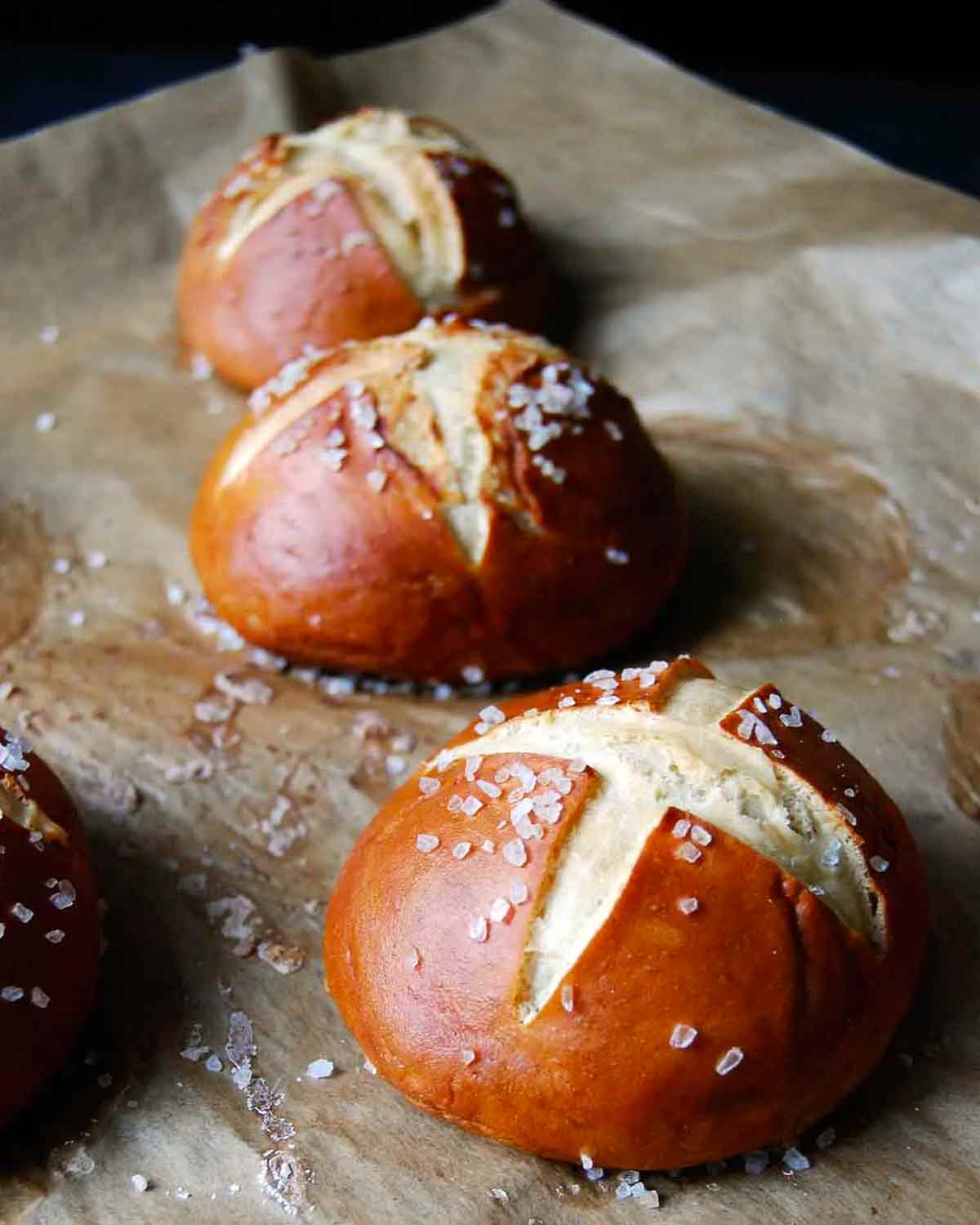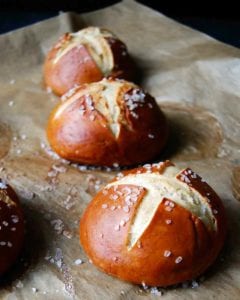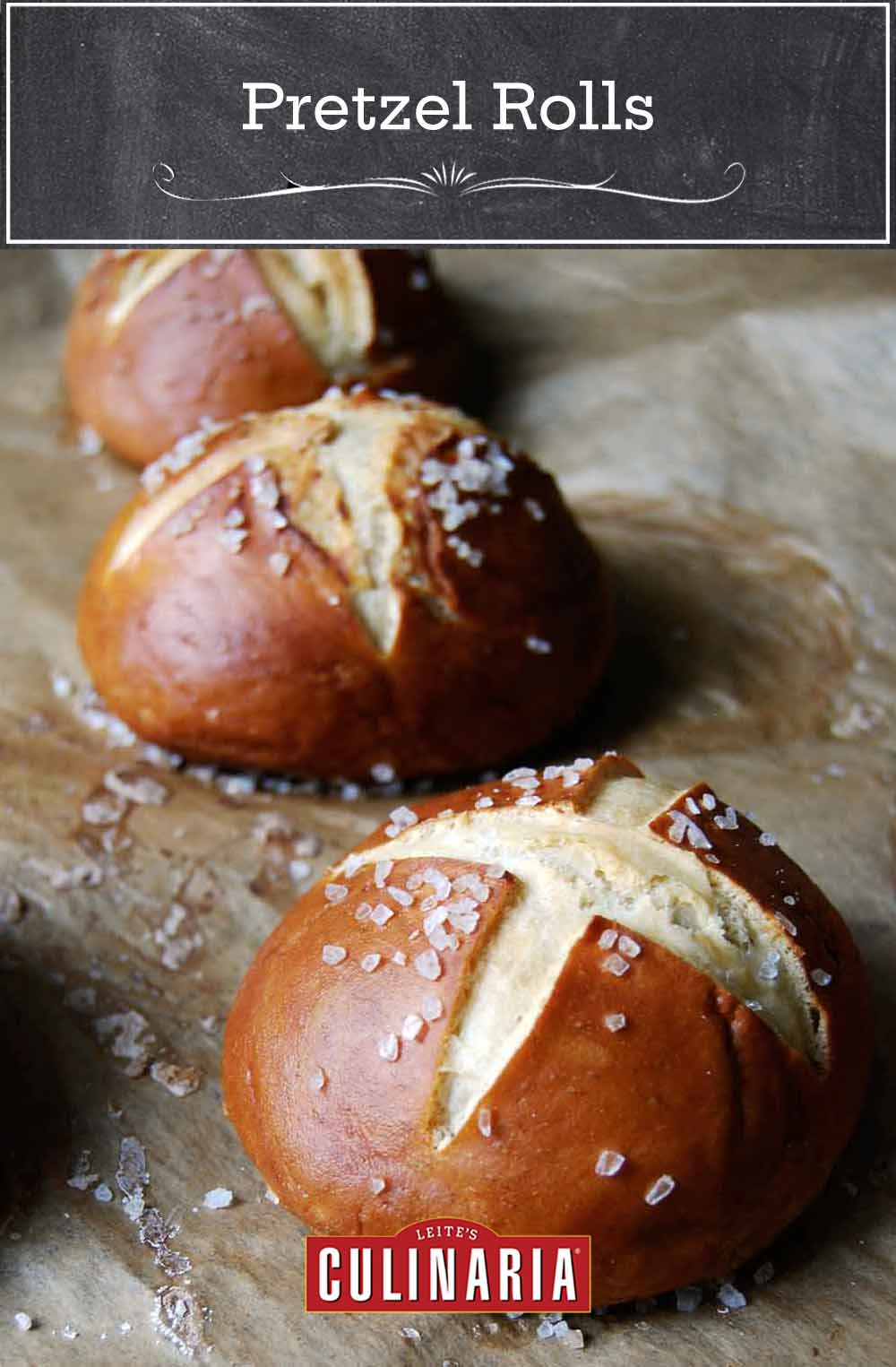
These pretzel rolls are easy to make at home and are just like the real German deal—shiny, salty, perfectly burnished, densely bread-y, and reminiscent of a soft pretzel but in a more versatile shape. Smother with butter, stuff with your favorite sandwich fixings, or inhale straight off the baking sheet.–Angie Zoobkoff
Pretzel Rolls FAQs
Good question. They contain basically the same ingredients: flour, yeast, salt, and water. But unlike regular rolls or bread, pretzel rolls are first boiled and then baked. This gives that their lovely mahogany color and shine with their characteristic chewy bite.
Want to save this?
They sure can. Place the baked rolls in a zip-top bag and freeze for up to 3 months. Thaw the frozen rolls, pop them in a hot oven, and serve them warm.
You can simply devour them, slathered with butter or mustard or straight up. Although you could also turn them into sandwiches, whether ham, tuna salad, leftover meatloaf, BLT. Seriously, you really can’t go wrong.

Pretzel Rolls
Ingredients
- 3 3/4 cups plus 1 tablespoon white spelt flour or unbleached all-purpose flour, plus more for working the dough
- One (1/4-ounce) envelope fast-acting yeast
- 2 teaspoons fine sea salt
- 1 1/4 cups water, lukewarm (about 110°F or 43°C)
- 3 tablespoons (1 1/2 oz) unsalted butter, melted and cooled
- 4 1/4 cups cold water
- 3 tablespoons baking soda
- Coarse sea salt
Instructions
Make the pretzel rolls dough
- In the bowl of your stand mixer fit with the dough hook, combine the flour, yeast, and salt.
- In a medium bowl, whisk together the 1 1/4 cups warm water and butter. The mixture should be lukewarm.
- Add the butter mixture to the flour mixture and mix until well combined, about 2 minutes. The dough shouldn’t be sticky.
- Transfer the dough to a lightly floured work surface and continue kneading and punching it down until you have a smooth and elastic ball of dough, 2 to 3 minutes.
- Place the dough back in the bowl, cover with a clean kitchen towel, and let rise in a warm place (preferably in a 100°F (35°C) warm oven) until double in size, about 60 minutes.
Shape the pretzel rolls
- When the dough has doubled in size, punch it down, take it out of the bowl, and knead it for about 30 seconds.
- Divide the dough into 10 equal portions of roughly 3 ounces (85 grams) each.
- Dust your hands with flour, place a portion of dough on the palm of one hand, and with the other hand forming a dome over the dough, roll the dough between your palms until the top is round and firm and you can feel the tension increasing against your hand, about 10 seconds. This creates surface tension and prevents the rolls from deflating and becoming flat. Place the roll on the parchment paper and repeat with the remaining dough.
- Cover the rolls with a towel and let rise in a warm place until puffy, about 20 minutes.
Boil the pretzel rolls
- Preheat the oven to 425°F (220°C). Line 2 baking sheets with parchment paper.
- In a large pot wide enough to fit 2 rolls at once, bring the 4 1/4 cups cold water and the baking soda to a boil. Carefully watch the heat as the baking soda-water mixture will foam up and you don’t want it to spill over.
- With a slotted ladle or spoon, gently slip 2 rolls into the boiling water and cook for 30 seconds. Flip them and cook for another 30 seconds, being careful to not let them stick to the bottom of the pot. Transfer the rolls to a wire rack to dry and repeat with the remaining rolls.
- Once dry, transfer them to the parchment-lined baking sheets.
Bake the pretzel rolls
- Use the tip of a sharp knife to score a cross on top of each roll and sprinkle with coarse sea salt. Bake the pretzel rolls, 1 sheet at a time, until golden brown, about 16 minutes.
- Transfer the rolls to a wire rack to cool slightly. Experience them while still warm, plain or with butter, although they're also quite nice at room temperature.

Explore More with AI
Nutrition
Nutrition information is automatically calculated, so should only be used as an approximation.
Recipe Testers’ Reviews
Did you know only 68% of the recipes we test make it onto the site? This recipe survived our rigorous blind testing process by multiple home cooks. It earned the Leite’s Culinaria stamp of approval—and the testers’ reviews below prove it.
This my friends, is not your ordinary pretzel rolls recipe. In fact, I found this recipe to be EXTRAordinary. The pretzel roll dough is simple to put together and takes only 2 hours to mix the dough, let it rise, shape it, boil it, and, finally bake it to a shiny, rusty red perfection!
I’ve never used spelt dough but I assure you I’ll never choose another flour for pretzels of any design, be it rolls, big fat soft pretzels or, as I also did with this dough, a nice big loaf for sandwiches. I found the white spelt at Whole Foods. It’s a bit pricey at nearly 3 dollars a pound, but after using it, I find the cost worthwhile.
The recipe as written gave me 8 good size hamburger rolls or 10 nice dinner rolls or a perfect size sandwich loaf. (The loaf I made didn’t have the usual oven spring associated with wheat dough but, it was a great sandwich loaf, that I DEMOLISHED in short order!)
I love that whatever I tried to make with this dough, all things pretzel worked to perfection without altering a thing other than the shape. If you use the dough hook, very little kneading will be necessary. This simple delicious recipe has already been given quite a workout in my home and will most certainly be added to the rotation for the rest of our natural lives!
These pretzel roll gems were salty, chewy, and doughy in every way you’d expect a soft pretzel to be. They were easy to make, the dough was extremely easy to work with, and the timing in the recipe was spot on. Easy enough for a weeknight and a winner with the whole family.
These pretzel rolls are winners—soft on the inside, slightly chewy on the outside, yeasty, and salty. They taste exactly like soft pretzels, just in bun form.
My rolls were done after 16 minutes, as stated, but they weren’t quite as brown as the picture. Mine were also a little more mottled than those in the picture. I might try making larger rolls to have for sandwiches—these rolls were closer to slider size. Not sure how they would bake if they were bigger. Sounds like I need to do some experimenting.
We ate ours plain and with butter and we liked them both ways. I think they would be fabulous as a sandwich bun—soft but sturdy enough to stand up to just about any filling. My husband thought a BLT on a bun would be a little bit of heaven. We ate most of the batch, so any sandwiches will have to wait until I have time to make more. Maybe tomorrow.
Very tasty pretzel rolls that are good warm with butter or at room temperature with sandwiches—they will not disappoint! You get the familiar “pretzel whiff and chewiness” when you bite into one, and the interior texture has a perfect balance of softness and firmness.
This recipe makes easy-to-handle dough, making it friendly to novice bread bakers. I used unbleached all-purpose flour (Gold Medal brand). Once you get going, the dough becomes smooth and bouncy in no time. When you turn over the rolls in the baking soda water, using a slotted ladle and a wooden spoon makes gentle handling easier.
I typically hand-knead bread dough for about 10 minutes, but this one “felt good” (held its tight round shape, was very smooth, and bounced right back after poking with a finger) after 5 minutes. I put the shaped dough back in the oven the second rise (what I usually do). It increased only slightly in volume after 20 minutes. My pretzel rolls didn’t look as uniformly brown as shown in the photo but they looked as expected—no mistake that they were pretzel rolls!
These pretzel rolls came together quickly, the measurements in the recipe were accurate, and the dough was very pliable. The dough wasn’t sticky. Rise times indicated in the recipe were accurate. My oven time was 30 minutes to produce a golden crust.














Hi folks,
I have attemped many a pretzel in my day with the baking soda/water combo. But none, and I mean none of them have ever looked like the pictures. Meaning, they are very light im color, not the gorgeous brown I’m hoping for. So naturally I’m wondering what I can reasonably expect if I try this recipe.. please advise!
Kristen, thanks so much for your thoughtful question—I completely get your frustration! Achieving that gorgeous, deep brown pretzel crust is the holy grail for so many bakers.
This recipe really stacks the deck in your favor: Using a boiling0hot baking-soda bath (rather than just a warm soak) helps the Maillard reaction along, producing a much richer and shinier crust. Boiling the rolls for 30 seconds per side in the baking soda solution, as directed, should set you up for much better color than you might have seen with milder methods.
Still not quite hitting those dreamy, dark brown tones? Here’s a tested trick: after baking, pop those rolls under the broiler for about 30 seconds. Watch them like a hawk—they’ll brown quickly! It’s a very home-kitchen-friendly shortcut that can help you get that deep burnished finish.
If you’re still not satisfied, traditional German pretzels use a lye bath, which is even more alkaline than baking soda and produces the deepest color and a signature flavor. You can but food-grade/food-safe lye.
Can’t wait to hear how your next batch turns out—here’s hoping these are the golden-brown beauties you’ve been after!
David, Thank you so much!! I’m going to dive in and take these tips very seriously!! Can’t wait. ❤️
Wonderful, Kristen!
One of my favorite recipes! I have made it many times and in many shapes. Funny story David…I first found one of your recipes many years ago. Because the recipe said it was from Leite’s Culinaria – I imagined you to be a little Italian lady named Leite! Imagine my surprise when I discovered you were a David! 🤣 Thank you for the consistently perfect recipes for many years – even if you aren’t a little Italian lady!!
Sue, you just made my week! That image of a little Italian nona named Leite in her flour-dusted apron is fantabulous! I’ve never heard that one before, and it absolutely tickles me.
I’m so glad the pretzel rolls have earned a spot in your rotation—and I love that you’ve had fun playing with different shapes. That kind of creative baking is exactly what I hope my recipes inspire.
Thank you for sticking with me all these years—even if I didn’t turn out to be the Leite you first pictured!
first time making pretzel rolls. i think i did something wrong… when i came to boiling the rolls spread out once i took them out of the water and almost flattened out. I thought i had a nice round roll form before putting them in the water bath.. water was not a full boil but was bubbling…. can an you give some suggestions
denice, so sorry to hear this.
Pretzel rolls losing their shape can be caused by a few things, but I think the most likely culprit is proofing. If the dough is under-proofed (not enough time), it won’t develop the structure it need to hold up to the water bath. On the other hand, if the dough is over-proofed, the trapped gas bubbles stretch the gluten beyond its limits (imagine an overinflated balloon), and the dough becomes fragile and deflates. Did the dough seem over-proofed?